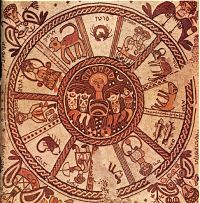159 - With All Your Heart: Ethics and Judaism
Posted on
Baḥya Ibn Paquda and Maimonides explore the ethical dimension of the Jewish scriptures and legal tradition.
Themes:
Further Reading
• Ibn Pakuda, The Book of Direction to the Duties of the Heart, trans. M. Mansoor (Oxford: 2004).
• R.L. Weiss with C.E. Butterworth (trans.), Ethical Writings of Maimonides (New York: 1975).
• R.L. Weiss, Maimonides’ Ethics (Chicago: 1991).

Andalusia


 ..
..



Comments
interconnection
It's interesting because Ibn Pakuda's or Maimonide's Book sounds quite similar to Islamic teachings and shows again how interconnected Jewish, Islamic, (Christianity maybe not as clear in this example) and Aristotle thought is.
Thanks for the Lecture!
"Actions are according to intentions, and everyone will get what was intended. Whoever migrates with an intention for Allah and His messenger, the migration will be for the sake of Allah and his Messenger. And whoever migrates for worldly gain or to marry a woman, then his migration will be for the sake of whatever he migrated for."
Related by Bukhari & Muslim
And thus We have made you a middle (just) nation to be witnesses over mankind, and (for) the Messenger to be a witness over you. (Quran 2:143)
In reply to interconnection by yunus
Christianity interconnection
As I have barely any knowledge of Islam or the Quran I was about to ask a question the other way around with sacred text quotes of my own but from the new testament!
I was wondering if there was any Christian influence on Ibn Pakuda's work since the example given about the king in India going to be exiled seems quite similar to "the parable of the unjust steward" in Luke 16:1 where even the moral of the story put in Jesus's mouth seems to be the same as in Ibn Pakuda's. Likewise, in Luke 18:9 there is another parable about a pharisee and a publican praying in the temple. The latter being ashamed of his sins and repentant, and the first self-rightiously thanking God for how good he is and how well he follows the law.
The Sermon of the Mount (Matthew 5) repeats this recurring theme that Tolstoy (and I hope I'm not misrepresenting him) holds as central in what he sees as the original or uncorrupted message of Christ, that The Kingdom of God is within you and that it is the intention "inside our hearts" (of course thanks to Galen we now know that it's inside our brains) rather than the external form of our actions that dictates the moral quality they have. Going as far as for Jesus to say that even by being angry at someone is tantamount to murder.
My question, therefore, is whether there is a direct Christian influence on Ibn Pakuda's thought or if this is just an effect of emphasizing intention over action within the context of the great emphasis that Jewish religion has on the observance of the law? Or whether or not this is a question that can be answered?
And now hearing that there is also a commonality with Islamic teachings, I'm also wondering whether this is something that Islam itself might have also taken from Christianity?
Regards,
Jorge
In reply to Christianity interconnection by Jorge
Christianity and Ibn Paquda
Interesting question! To be honest I don't know; it is clear from the work itself that he has thought a bit about both Islam and Christianity (given that he includes spokesmen of these two religions) but I don't recall seeing evidence of detailed acquaintance with the New Testament.
I enjoyed your sly Galen reference there!
Music used in video
Hello professor, what’s the name of the song used at the beginning and end of this podcast episode? Thank you!
In reply to Music used in video by Edward S
Music
Hi there! You can see links to all the music clips under Links at the bottom of the page.
Add new comment